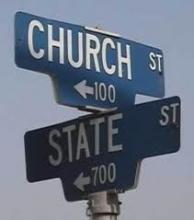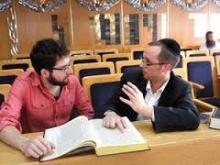Module 3: Religious and Secular
church-state.jpg

I. Introducing Issues of Religion and State (15 mins)
Return to the opening words of Megillat Ha’atzmaut (Handout 3a); how do you understand Israel as both the homeland of the Jewish people and a modern democratic state? What do you think makes Israel a Jewish state? Brainstorm with a partner and share with the whole group.
Clarify the following points:
- The role of the Chief Rabbinate (civil affairs, conversions, marriages, divorces, funerals, etc.)
- The role of the Israeli government, Prime Minister, Knesset, and Supreme Court
- Distinguishing between secular and religious Jews in Israel; and clarify that both are considered Jews; you might engage the group in a wider discussion about Judaism being a religion, an ethnicity, and even a nationality. What does the group think about these different definitions?
II. Activity: The Bar-Ilan Street Case (40 mins)
Ask participants to read the 1996 New York Times article about the Bar-Ilan Street case and discuss the questions in pairs (Handout 3b). After the allotted time for these small-group disussions, everyone can reconvene to discuss the questions.
After the discussion, share with the participants that the majority opinion on the Israeli Supreme Court ruled that the state is required to make reasonable accommodation for the needs of individuals and communities in cases such as these, and equated reasonable with balanced—the more balanced the approach, the more reasonable it is.
III. Comparing Israel and America (20 mins)
Have the participants watch a clip from this 2006 speech of then-Senator Barack Obama to a liberal Christian social action group. Watch from 1:41-7:56 here: http://www.youtube.com/watch?v=wVt59yd2W0U.
The text of the speech is included in Handout 3c.
Discuss the following questions:
- How does President Obama define the proper balance between religion and state in America?
- How would you compare and contrast the religious situations in America and Israel? What is the same and what is different?
Following the screening of the Obama video clip, engage participants in a wrap-up discussion that examines the similarities and differences between how the U.S. and Israel relate to questions of religion and state (widely called "church and state" in the U.S.). Acknowledge that the fundamental approach to the issue is very different in the two countries and encourage the group to consider the reasons for these differences. How might each country be different if it adopted the other's approach? Could either country have chosen a different path, and if so how would that different path have impacted society?
Time permitting, this can be a great group discussion. The topic can also be assigned as a one-page writing assignment to be completed at home.
/index.jpg?itok=p8x2vlJQ)
/index.jpg?itok=VcjO4eSX)


